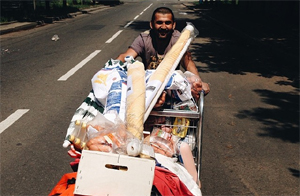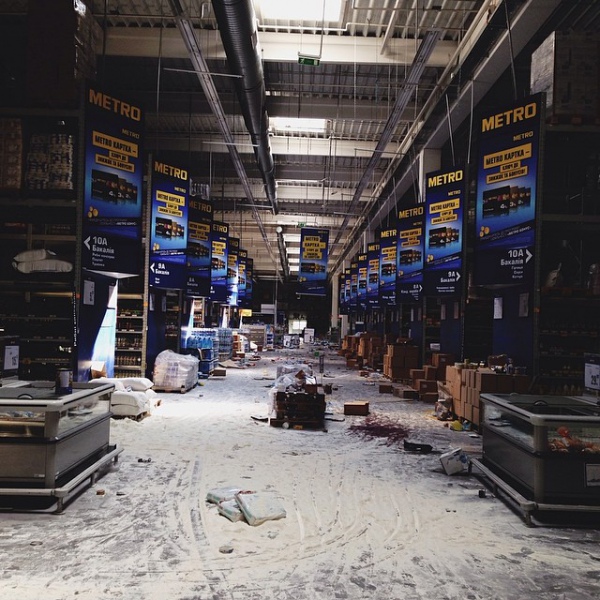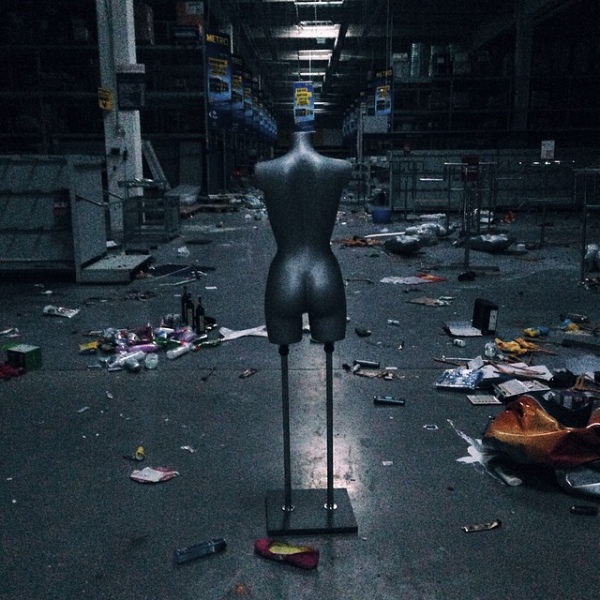 Yekaterina Sergatsova, UP.Life
Yekaterina Sergatsova, UP.Life
A small, shabby shop in the centre of Donetsk. There are practically no customers. I am greeted by the owner of the shop Petro, a smart phlegmatic middle-aged man.
“We are working more as security guards here,” he says almost in a whisper, even though there is nobody there to eavesdrop. “Recently, I have been coming here every day myself, to prevent anything from happening. They are not messing with us yet, what is the point? However, there is no point to mess with others either, but they still do it…”
Since the representatives of the so-called People’s Republic of Donetsk have started to openly walk the streets with weapons and engage in overt robbery and maraudery, business here has slowly started to stagnate.
The majority of the banks have closed, car shops have stopped working, many cafés in the centre are working with interruptions. McDonald’s was the first of the food industry representatives to close down, it was followed by other chains as well.
“For some time our shop was very much in demand,” says Petro. “But as soon as someone sees that you are in demand, you start attracting the mafia’s attention, and this leads to well-known consequences.
Essentially, small business in Donetsk is not business in itself. We are all self-employed here, and not businessmen, because you are simply feeding your family and paying taxes, and the tax services are constantly terrorising you. Here you cannot be visible, because it is simply dangerous. Therefore there is no room for creativity in business either.”
Petro moved to Donetsk from Western Ukraine almost thirty years ago, but he does not consider himself a local here. He says that two worlds co-exist in this region, two completely different cultures, and it is unlikely they will ever come together.
“These differences did not start now, but back during the Soviet times,” says he. “When I came here from a western Ukrainian village, I saw that here people are earning a lot of money, as opposed to the salaries I saw back there. It was a surprise for me, that there, the people who get small change, manage to build good houses and help their parents, and here, the people who gain much more, have nothing. Even their apartments were given by the state.
They don’t have the motivation, the will to do anything by themselves. Their life goes on without any plans for the future. And I don’t think they are aware of it.”
According to the owner of the shop, the reason for everything that is happening in Donbas now is fear: “The people are living in fear which is constantly developing. They don’t want to be free, they don’t want change. In reality, they were satisfied with everything before things started happening here. For many, the world does not exist outside of Donbas.
You have to understand that people here are living by prison laws. This is obvious in business as well. If they find out you don’t have a “cover,” they will start bothering you sooner or later. Because someone who works honestly, without a “patron,” cannot be controlled. Is it possible to work in such conditions?
When Yanukovych came to power, he wanted to transfer this model of government to the entirety of Ukraine. Such a Ukraine satisfied the Kremlin fully, as it was easier to control. Luckily, not all were ready to take it.”
Olexiy had a small machine-building production in Donbas – he produced car jacks and other mechanisms for metallurgic and chemical plants. He had fifty employees.
The company worked for the biggest Ukrainian establishments and even began to get through to the European market.
Now Olexiy is trying to transfer his facility outside of Donetsk oblast, though it is not easy to move the production and employees to another location.
“I understood back in April that it was time to flee. First, the alcoholics and druggies with weapons appeared, now there are bearded guys, professional soldiers, which there have never been in Donetsk. There is practically nobody left of business-owners I know here, everyone is moving their business.”
According to Olexiy, the situation in Donbas influenced the schematics of work and logistics first of all: “Nobody wants to go to Donetsk, nor leave Donetsk. The separatists are very interested in cargo vehicles, and nobody wants to risk their transport or people. My acquaintances have either moved their vehicles or hidden them for some time in underground garages. They are selling transport and apartments to finally move out of here…
Business is only flourishing with those who have made peace with the terrorists and who is ready to make long-term investments – they are buying apartments in Kramatorsk and Sloviansk for practically nothing, counting on selling them for more several years later.
But the thing is not only in the difficulty of work. The people that have achieved something and have the ability to think understand that they don’t want to and cannot live together with those who is screaming, ‘Russia, Russia!’ hysterically. This is, essentially, a class revolution.”
According to the businessman, in the nearest future the amount of job offers in small and medium business in Donbas will decrease by half, at the very least. If the same happens with big business, mines will stop – this will lead to a global social and economical crash.
The citizens of Donetsk oblast will simply have nothing to eat. Many have already started saving a lot, already the lack of cash in the region can be felt.
“Ninety-nine percent of business owners support the integrity of Ukraine,” says Olexiy. “All thinking people – businessmen, managers, teachers, intelligentsia – have remained with Ukraine. Those who have not gained anything in this life with their mind or hands have nothing to lose – but now they have an opportunity to take up a rifle and take what they haven’t earned from their neighbour.”
Igor, a well-known lawyer in the region, who engages in protecting the interests of big business owners, gives a simple answer to the question as to what is happening to the businesses in Donbas: “Nothing is happening. There is nobody here anymore.”
He has suspended the work of his law firm recently for security reasons, so far – temporarily.
“Donbas is a region which has always been governed by criminal structures,” says he. “A stencil was created here, one that created the illusion that some sort of elections, some sort of political activity is happening in the region.
There have been no elections here, the people did not vote. Therefore now the mayors and members of the councils cannot lead the people or influence them somehow, because they know that the people did not elect them and the people understand that these officials are alien.
This situation is also characteristic of Russia, and for us as well – a “Potemkin village” of sorts, props. This village started to crumble accordingly. Because if we always flush trash into the river, sooner or later, it will disappear.
The people are under the impression that Akhmetov can influence something. But how is he able to influence anything? He has ended up as a hostage of the situation which he himself has been fuelling. The people working at his factories have been told time and again that the Kyiv government is illegitimate, that it is stealing from them.
And now when he has been caught in the circumstances, what can he do? Admit that those were lies and call on the people to fight? This is absurd, to think this way.
The genie let out by government has turned out to be too dangerous.”
According to Igor, there are practically no business owners left in Donbas, and the infrastructure is falling apart.
The only way out, to his mind – is the continuation of the anti-terrorist operation, a full-scale cleanup of the region from armed people: “We have to clear Donbas and then hold real elections here after this.
Let the people elect real leaders, ones they trust and ones that will be responsible for them. And if we cannot find such people here, this means we have to import them.
Only in this case anything can be re-established here.”
Source: Life.Pravda
Translated by Mariya Shcherbinina





